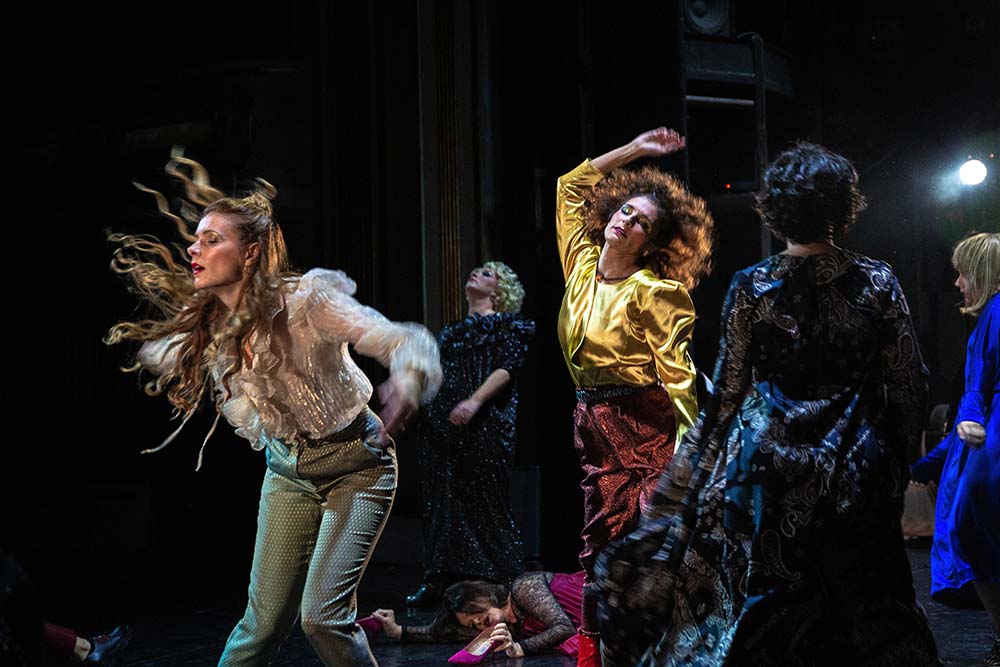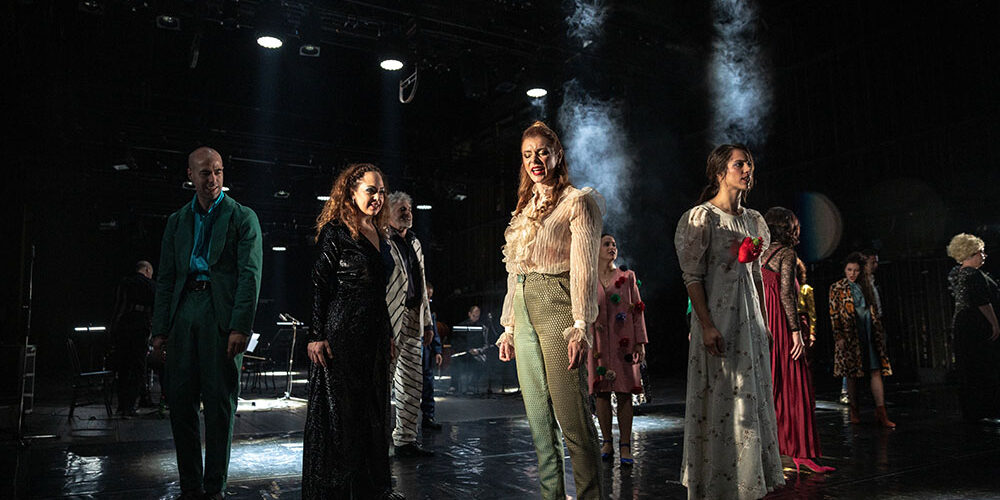National Theatre, Belgrade, premiere 8th October 2022
Each of us sings our own song, composed according to the rules of the community. In the voice of the individual, we hear the echo of collective belonging. The rhythm of such music is often not easy to dance to, and the harmonies can sometimes seem more like a scream.
The contemporary world is full of screams, so it should come as no surprise when the most subversive form of art turns out to be the one that teaches us how to love living in unbearable noise.
Milena Marković’s verse novel Children is one of those inspiring reminders that one can find contentment and peace despite the pressures of the world. Marković writes poetry and plays in a distinctive style that combines rebelliousness with melancholy, vulgarity with sublimity, brutality with tenderness. Her writing is uniquely musical, which makes her one of the most popular authors in Serbia. People love to read her poetry and attend performances based on her plays. She’s also popular with her peers, as evidenced by the numerous poetry and theatre awards, she has received. Children, her latest work, won the NIN Award for Best Novel of 2021.
The narrator of the novel sings verses about her childhood, the difficulties and delights of growing up, an early pregnancy, a mother’s relationship with a child with special needs, coping with growing older, looking back on life, the eternal perspective of children we keep within us as grown-ups. Dramaturg Dimitrije Kokanov condenses the abundance of themes and motifs to seventeen representative segments, which composer and director Irena Popović transforms into original modern opera songs.
As a composer, Popović often works with the country’s most high-profile theatre makers, such as Kokan Mladenović and Andraš Urban. It’s clear that during these collaborations she has been developing her own directorial perspective. With Children, she presents herself as a creative force, fresh and original and ready to enrich the Serbian stage.
There are not many brutal and ugly scenes in Popović’s opera, be it rough sex or a grandfather groping the girls, which, by the way, Marković often mentions almost casually in the novel as if it is not so important. However, the basic image of the protagonist’s life, who isn’t liked by the kids at school, who is the first to smoke marijuana and hashish and drink pills with vodka and beer, has been preserved. As in the novel, she’s still concerned about the welfare of her children, questions about her past and present life; she still wonders if she deserves everything she has.

Deca, Narodno Pozoriste, Beograd
Overly specific lines from the novel are omitted in favour of those that illustrate a typical existence. In keeping with this dramaturgical decision, an atypical opera is created in which there are no characters. The universal words are sung by all members of the cast. Only from time to time do individuals stand out with short solos.
The densely packed poetic structure takes on a new form in Popović’s diverse musical cosmos of melodic scores, repetitive tonal minimalism, conceptual music of birth cries and electronic clubbing beats. The chamber orchestra accompanies the vocal collective, which consists of performers of different ages: a children’s choir, young and old. It departs from the form of classical opera because the singers are mostly actors and actresses who don’t have a trained operatic voice like the three professional singers who perform. The use of contrasts, such as these two types of singing voice and the experimentation with form, are the two most impressive artistic aspects of Popović’s work.
The song ‘Shame’ is the best example of how the show plays with the operatic form. The singer Iskra Sretović performs a speech with a short melodic reference to Mozart’s aria Queen of the Night from the opera The Magic Flute in an operatic voice. By combining elements of classical opera with everyday speech, Popović underlines the psychological tension inherent in the song. The woman has internalises the judgements of those around her and belittles her own worth, reproaches and condemns herself, her thoughts, and actions – she believes that she deserves nothing of what she has.
Another example is the children’s choir, which is separated from the rest of the ensemble and sits in a box that has an exit directly onto the stage. At the beginning of the performance, a girl steps in front of the audience, turns to the performers and looks at them. The performance begins with her moving back into the box, into the space of the parabasis, the place where the roles of observer and performer meet. Such a beginning suggests a reversal of perspective: the child remembers and watches life from birth to old age. In the song, which is also entitled ‘The Children’ in the libretto, the children’s choir performs a contemplation of death, a kind of memento mori. This perspective, which directly confronts the beginning and the end of life, observation with participation, hope for the future with remembrance of the past, creates a simultaneously joyful and sentimental Carpe Diem effect.
The movements on stage are gentle and subtle. Igor Koruga’s choreography balances the rhythm of the music with the thematic focus of the songs, while taking care to emphasise another contrast: collective movement and individual displacement.
The visual identity of the piece is shaped by an empty space, the absence of scenography places the focus on the people, and Selena Orb’s striking costume design, with its diverse mix of colours and patterns. This simultaneously emphasises the individuality of the characters and their sameness by making them all equally colourful. Nevertheless, their well-tailored wardrobes gives the impression of class uniformity within this opera – it integrates many forms of diversity except poverty.
Despite this, Children manages to create a sense of community and belonging, to evoke memories of childhood, to awaken the voices of the children inside every adult and to generate raw emotion. While the cacophony of political turmoil, the howl of ideological divisions, the screech of economic insecurity and the thunder of war can be heard all around us, Children represents the much-needed harmonisation of the chaos outside and inside of us all, of ourselves and our place in the world; a pause, a space of calm and refuge within this sound and fury, awakening in us a sincere love of life.
Credits:
Composer and director: Irena Popović//Libretto Dimitrije Kokanov // Music dramaturg Jelena Novak //Dramaturgy Dimitrije Kokanov
Choreography Igor Koruga//Costumes: Selena Orb//Scenography: Miraš Vuksanović
Cast: Nela Mihailović, Suzana Lukić, Predrag Miletić,Vanja Milačić, Pavle Jerinić, Milena Đorđević, Bojana Stefanović, Bojana Bambić, Dragana Varagić, Aleksandar Vučković, Miona Marković,Teodora Sparavalo, Jelena Blagojević, Vladan Matović
For tickets and further information, visit: Narodnopozoriste.rs
Andrej Čanji is a theatre critic and theatrologist based in Belgrade.








